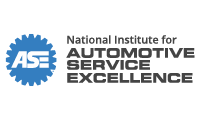The Best Family Owned & Operated Auto Care Centers in Buford and Cumming
Team Ryan Automotive News Articles
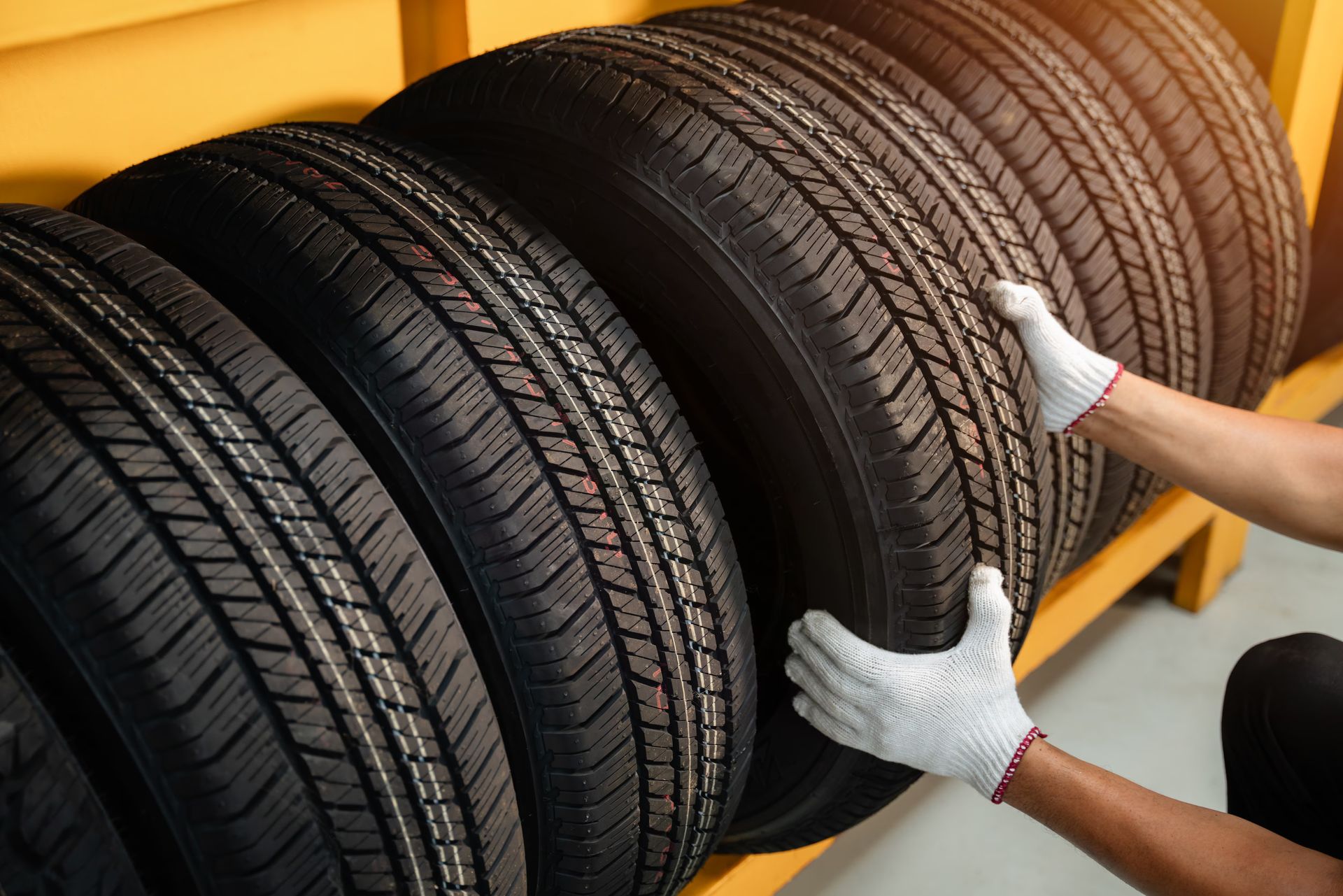
Make Safety a Priority with Tire Maintenance from Team Ryan Automotive in Buford and Cumming As the school year kicks off and traffic increases around Buford and Cumming , your vehicle’s tires become more important than ever. Whether you are driving through busy school zones, sitting in carpool lines, or commuting long distances every day, the condition of your tires directly affects your safety, fuel efficiency, and overall performance on the road. At Team Ryan Automotive, we help Georgia drivers stay ahead of seasonal driving demands by focusing on the components that matter most. Your tires are your only point of contact with the road, making them essential for control, traction, and braking in all driving conditions. Before the school year ramps up, make sure your tires are ready for everything the road throws your way. Why Tire Maintenance Is Essential During the School Season Back-to-school driving typically involves more stop-and-go traffic, tighter turns in crowded parking lots, and more time spent behind the wheel overall. Many drivers also carry additional passengers or gear during this time, which increases the load placed on their tires. Without regular maintenance, tires can wear unevenly, lose air pressure, or fail unexpectedly. Driving with worn or underinflated tires makes it harder to steer, lengthens stopping distance, and increases your risk of a blowout. That risk is even greater when you are rushing through morning traffic or navigating wet roads during fall storms. Tire maintenance helps prevent these issues and gives you peace of mind as you drive your family to school, practice, or appointments. How to Inspect Your Tires at Home Even before visiting an auto shop, there are a few quick checks you can do yourself to assess the condition of your tires . Start by walking around your vehicle and checking the following: Tread Depth: Use the penny test to measure tread depth. Insert a penny into the tire groove with Lincoln’s head facing down. If you can see the top of his head, your tread is too low, and it is time to replace the tire. Sidewall Condition: Look for cracks, bulges, or cuts in the sidewall. These can indicate structural damage that may lead to a blowout. Tire Pressure: Use a tire gauge to measure air pressure and compare it to the recommended levels listed in your owner’s manual or on the driver-side door sticker. Be sure to check the tires when they are cold, not after driving. Tire Wear Pattern: Uneven tread wear can point to alignment issues or improper inflation. If the wear is more severe on one edge or in the center, bring your vehicle in for a professional inspection. Professional Tire Services You Should Schedule While home checks are helpful, they are not a substitute for a thorough inspection by a certified technician. At Team Ryan Automotive, our tire services go beyond basic checks, ensuring every aspect of your tire system performs properly. We recommend the following services before the school year starts: Tire Rotation: Rotating your tires regularly helps ensure they wear evenly and last longer. Different positions on the vehicle experience different types of wear, so rotating them every 5,000 to 7,500 miles helps even this out. Wheel Alignment : If your vehicle pulls to one side or your steering wheel is off-center, it could be a sign of misalignment. Misaligned wheels cause uneven tire wear, reduce handling, and shorten tire lifespan. We use precise alignment tools to correct the issue and protect your tires. Tire Balancing : If you feel vibration while driving at higher speeds, your tires may be out of balance. Tire balancing ensures that weight is distributed evenly around the wheel, helping to prevent excessive wear and suspension damage. Flat Repair: If you have a slow leak or have recently run over a nail, our team can often repair the tire and restore it to full function. We always inspect the tire thoroughly to ensure the damage is repairable and safe. Tire Replacement : If your tread is worn out or the sidewall is damaged, we offer high-quality replacement tires from top brands. Our technicians will help you choose the right tire for your vehicle, driving habits, and budget. Why Tire Pressure Is a Big Deal in Georgia Weather Georgia’s weather can fluctuate, especially as summer transitions into fall. These temperature changes affect your tire pressure more than you might expect. For every 10-degree change in temperature, your tire pressure can fluctuate by one to two pounds per square inch. Underinflated tires reduce fuel efficiency and increase heat buildup, which can cause premature tire wear or even failure. Overinflated tires reduce traction and can make your ride less comfortable. Maintaining tire pressure at the manufacturer’s recommended level enhances your gas mileage, prolongs tire life, and ensures your vehicle remains stable during sudden stops or turns. At Team Ryan Automotive, we check and adjust tire pressure as part of every inspection and service. We want your tires to perform their best, regardless of the temperature outside. Tread Depth and School Zone Safety Stopping distance is critical when driving in school zones. Children can appear suddenly, other vehicles may stop without warning, and speed limits are significantly reduced. Worn-out tires cannot grip the road effectively, especially in wet conditions, and that compromises your ability to brake quickly. Tires with deep, healthy tread offer better traction on wet pavement and allow for more responsive braking. If your tread depth is low, especially as rainstorms become more frequent, it is time to replace your tires. Driving through Buford and Cumming school zones with proper tread and pressure ensures you can stop when it matters most. What Makes Team Ryan Automotive Different When you visit Team Ryan Automotive in Buford or Cumming, you are not just getting a tire service. You are getting a partner who prioritizes your safety, explains your options clearly, and never pressures you into repairs you do not need. Our technicians are ASE certified and trained to work with all makes and models. Whether you drive a compact sedan, an SUV, or a family van, we have the tools and knowledge to care for your tires the right way. We believe in proactive service, not reactive repairs. Our goal is to help you stay ahead of issues before they become emergencies. That is why we encourage all drivers to include tire maintenance in their back-to-school car care routine. Schedule Your Tire Inspection Before the School Year Gets Busy The back-to-school season brings increased mileage, tighter schedules, and more road risks. Do not let worn or underperforming tires put your family’s safety in jeopardy. Let Team Ryan Automotive in Buford or Cumming inspect your tires and make sure they are ready for everything this season demands. Our tire services are fast, affordable, and focused on keeping your vehicle road ready. Whether you need a simple rotation or a full set of new tires, we are here to help. Call or schedule online today . Drive smarter, safer, and more confidently this school year with help from the tire experts at Team Ryan Automotive.
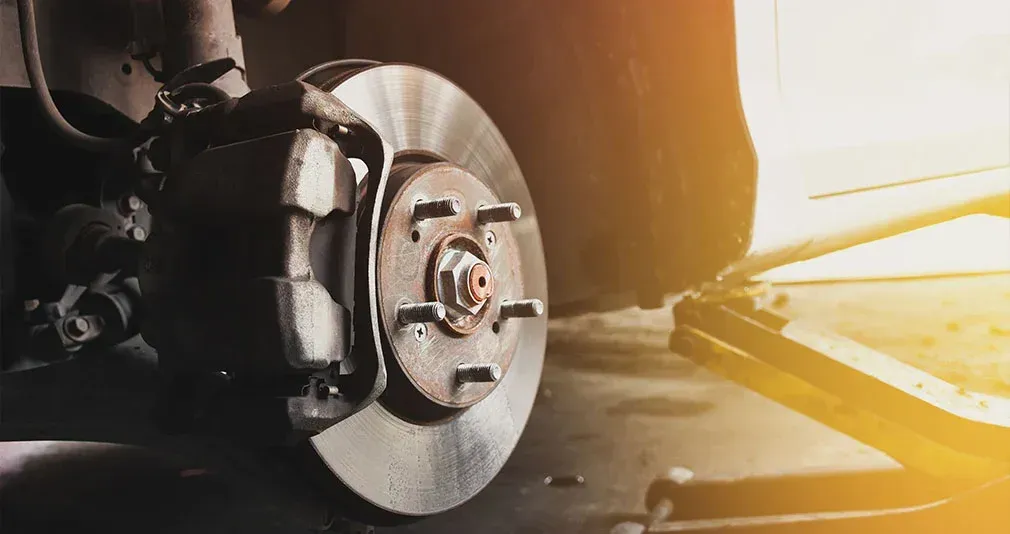
How to Prevent Common Back-to-School Breakdowns with Team Ryan Automotive in Buford and Cumming Back-to-school season brings early mornings, packed schedules, and an increase in daily driving. Whether you are taking your kids to school, commuting to work, or handling multiple pick-ups and drop-offs, your vehicle needs to be reliable, efficient, and safe. The last thing any driver wants is to deal with a breakdown during the morning rush or be stuck on the side of the road when school traffic is at its peak. At Team Ryan Automotive, serving Buford and Cumming , we help drivers prepare for the demands of the new school year with inspections and preventive maintenance designed to catch problems before they interrupt your schedule. If you want to avoid unexpected car trouble during the busiest time of year, now is the perfect time to make sure your vehicle is ready. Why Breakdowns Are More Common During Back-to-School Season As summer ends, driving habits change. Vehicles that were used lightly during summer vacations or sat idle in the heat now return to daily commutes, stop-and-go traffic, and regular use. Increased mileage, rising temperatures, and heavy loads can quickly reveal issues that have been developing quietly for months. Some of the most common problems we see at the start of the school year include dead batteries, overheating engines, tire blowouts, brake failures, and electrical malfunctions. These are often the result of worn-out parts, low fluid levels, or lack of maintenance. The good news is that most of these breakdowns are completely preventable with a timely inspection and a few smart service choices. Dead Battery One of the most common causes of unexpected breakdowns is a dead or weak battery. After months of exposure to summer heat, many batteries are already strained before the start of the school year. Once temperatures cool down and early morning startups become the norm, a worn-out battery may not have enough power left to crank the engine. To avoid getting stranded, schedule a battery test at Team Ryan Automotive. Our technicians will check your battery’s voltage, charge capacity, and overall health. If your battery is more than three years old or showing signs of failure, we can help you choose the correct replacement before it lets you down. Overheating Engine Stop-and-go traffic, long idling times in school pickup lines, and forgotten maintenance can all cause your engine to overheat. Many drivers ignore the warning signs until it is too late, leading to costly repairs. Prevent overheating by having your cooling system inspected. This includes checking the radiator, thermostat, hoses, coolant levels, and water pump. We recommend flushing and replacing coolant based on the TRA Maintenance schedule . Our technicians in Buford and Cumming can test your system for leaks and ensure everything is circulating properly. Tire Trouble Tires that are underinflated, worn out, or damaged are more likely to cause problems during the back-to-school rush. You are more likely to drive over curbs, potholes, and parking lot debris when you are navigating crowded school areas, which increases your risk of tire issues. Before school starts, inspect your tires for tread depth, sidewall damage, and proper air pressure. Uneven wear may indicate alignment problems, which can reduce handling and accelerate tire deterioration. Team Ryan Automotive offers free tire inspections and pressure checks at both locations, so you can drive with peace of mind. Brake Failure Brakes that are noisy, soft, or slow to respond are a serious safety risk, especially in school zones where quick stops are often required. The increased stop-and-go driving during the school year puts even more strain on your braking system. We recommend having your brakes checked for pad thickness, rotor wear, and fluid condition. If you hear squealing, grinding, or feel vibration when braking, do not delay. Our technicians can identify the issue and recommend service that restores safety and performance. Warning Lights on the Dashboard Dashboard warning lights often appear at the worst times. Whether it is your check engine light, ABS light, or low tire pressure alert, these signals should never be ignored. A small sensor issue can become a major mechanical failure if left unchecked. If a warning light comes on, bring your car to Team Ryan Automotive. We use advanced diagnostic tools to read fault codes and pinpoint the exact issue, saving you time and guesswork. Our team will explain what needs attention and what can wait, so you can make informed decisions that fit your schedule and budget. Poor Visibility Clear visibility is essential for safe driving, especially during early morning or late afternoon commutes. Headlights, taillights, and windshield wipers must function properly in all weather conditions. Check all exterior lights to make sure they are working and replace any that are dim or burned out. Inspect your wiper blades for streaking or skipping. If they are worn out, we can install new blades quickly during your visit. Do not forget to top off windshield washer fluid to keep your view clear on rainy or foggy mornings. HVAC System Performance Your heating, ventilation, and air conditioning system should be ready for fluctuating weather as well as for keeping passengers comfortable during daily drives. A well-maintained HVAC system also plays a role in defrosting your windshield and maintaining safe visibility. If your AC is blowing warm air or your defrost is slow to respond, schedule an inspection. Our team will check the cabin air filter, blower motor, refrigerant level, and AC compressor to ensure consistent and reliable performance. Suspension and Steering Issues Rough rides and poor handling can make back-to-school driving stressful and unsafe. Worn suspension components may not absorb road impact correctly, causing instability during turns and braking. Have your shocks, struts, and steering components inspected if you notice clunking noises, pulling to one side, or excessive bouncing. Team Ryan Automotive performs complete suspension diagnostics to restore ride quality and handling precision. The Importance of Preventive Maintenance Preventive maintenance is the smartest investment you can make in your vehicle. A small service today could prevent a major repair tomorrow. At Team Ryan Automotive, we provide complete vehicle inspections designed to prepare your car for the season ahead. Our back-to-school readiness services include: Battery testing Cooling system inspection Brake inspection and fluid check Tire pressure and tread evaluation Oil and filter change Wiper and light check HVAC system test Diagnostic scan for warning lights Our goal is to help Buford and Cumming drivers start the school year with confidence, not car trouble. Schedule Your Inspection with Team Ryan Automotive There is no better time to schedule a complete inspection than right now. Before the school bell rings and your calendar fills up, bring your vehicle to Team Ryan Automotive for a back-to-school checkup. Our ASE-certified technicians are here to make sure your vehicle is ready for the morning commute, the after-school rush, and every mile in between. With convenient locations in Buford and Cumming , flexible appointment times, and honest service you can trust, we make it easy to stay on top of maintenance. Call or schedule online today . Keep your family safe, your schedule on track, and your car in peak condition this school year with help from Team Ryan Automotive.

How to Prevent Common Back-to-School Breakdowns with Team Ryan Automotive in Buford and Cumming Back-to-school season brings early mornings, packed schedules, and an increase in daily driving. Whether you are taking your kids to school, commuting to work, or handling multiple pick-ups and drop-offs, your vehicle needs to be reliable, efficient, and safe. The last thing any driver wants is to deal with a breakdown during the morning rush or be stuck on the side of the road when school traffic is at its peak. At Team Ryan Automotive, serving Buford and Cumming , we help drivers prepare for the demands of the new school year with inspections and preventive maintenance designed to catch problems before they interrupt your schedule. If you want to avoid unexpected car trouble during the busiest time of year, now is the perfect time to make sure your vehicle is ready. Why Breakdowns Are More Common During Back-to-School Season As summer ends, driving habits change. Vehicles that were used lightly during summer vacations or sat idle in the heat now return to daily commutes, stop-and-go traffic, and regular use. Increased mileage, rising temperatures, and heavy loads can quickly reveal issues that have been developing quietly for months. Some of the most common problems we see at the start of the school year include dead batteries, overheating engines, tire blowouts, brake failures, and electrical malfunctions. These are often the result of worn-out parts, low fluid levels, or lack of maintenance. The good news is that most of these breakdowns are completely preventable with a timely inspection and a few smart service choices. Dead Battery One of the most common causes of unexpected breakdowns is a dead or weak battery. After months of exposure to summer heat, many batteries are already strained before the start of the school year. Once temperatures cool down and early morning startups become the norm, a worn-out battery may not have enough power left to crank the engine. To avoid getting stranded, schedule a battery test at Team Ryan Automotive. Our technicians will check your battery’s voltage, charge capacity, and overall health. If your battery is more than three years old or showing signs of failure, we can help you choose the correct replacement before it lets you down. Overheating Engine Stop-and-go traffic, long idling times in school pickup lines, and forgotten maintenance can all cause your engine to overheat. Many drivers ignore the warning signs until it is too late, leading to costly repairs. Prevent overheating by having your cooling system inspected. This includes checking the radiator, thermostat, hoses, coolant levels, and water pump. We recommend flushing and replacing coolant based on the TRA Maintenance schedule . Our technicians in Buford and Cumming can test your system for leaks and ensure everything is circulating properly. Tire Trouble Tires that are underinflated, worn out, or damaged are more likely to cause problems during the back-to-school rush. You are more likely to drive over curbs, potholes, and parking lot debris when you are navigating crowded school areas, which increases your risk of tire issues. Before school starts, inspect your tires for tread depth, sidewall damage, and proper air pressure. Uneven wear may indicate alignment problems, which can reduce handling and accelerate tire deterioration. Team Ryan Automotive offers free tire inspections and pressure checks at both locations, so you can drive with peace of mind. Brake Failure Brakes that are noisy, soft, or slow to respond are a serious safety risk, especially in school zones where quick stops are often required. The increased stop-and-go driving during the school year puts even more strain on your braking system. We recommend having your brakes checked for pad thickness, rotor wear, and fluid condition. If you hear squealing, grinding, or feel vibration when braking, do not delay. Our technicians can identify the issue and recommend service that restores safety and performance. Warning Lights on the Dashboard Dashboard warning lights often appear at the worst times. Whether it is your check engine light, ABS light, or low tire pressure alert, these signals should never be ignored. A small sensor issue can become a major mechanical failure if left unchecked. If a warning light comes on, bring your car to Team Ryan Automotive. We use advanced diagnostic tools to read fault codes and pinpoint the exact issue, saving you time and guesswork. Our team will explain what needs attention and what can wait, so you can make informed decisions that fit your schedule and budget. Poor Visibility Clear visibility is essential for safe driving, especially during early morning or late afternoon commutes. Headlights, taillights, and windshield wipers must function properly in all weather conditions. Check all exterior lights to make sure they are working and replace any that are dim or burned out. Inspect your wiper blades for streaking or skipping. If they are worn out, we can install new blades quickly during your visit. Do not forget to top off windshield washer fluid to keep your view clear on rainy or foggy mornings. HVAC System Performance Your heating, ventilation, and air conditioning system should be ready for fluctuating weather as well as for keeping passengers comfortable during daily drives. A well-maintained HVAC system also plays a role in defrosting your windshield and maintaining safe visibility. If your AC is blowing warm air or your defrost is slow to respond, schedule an inspection. Our team will check the cabin air filter, blower motor, refrigerant level, and AC compressor to ensure consistent and reliable performance. Suspension and Steering Issues Rough rides and poor handling can make back-to-school driving stressful and unsafe. Worn suspension components may not absorb road impact correctly, causing instability during turns and braking. Have your shocks, struts, and steering components inspected if you notice clunking noises, pulling to one side, or excessive bouncing. Team Ryan Automotive performs complete suspension diagnostics to restore ride quality and handling precision. The Importance of Preventive Maintenance Preventive maintenance is the smartest investment you can make in your vehicle. A small service today could prevent a major repair tomorrow. At Team Ryan Automotive, we provide complete vehicle inspections designed to prepare your car for the season ahead. Our back-to-school readiness services include: Battery testing Cooling system inspection Brake inspection and fluid check Tire pressure and tread evaluation Oil and filter change Wiper and light check HVAC system test Diagnostic scan for warning lights Our goal is to help Buford and Cumming drivers start the school year with confidence, not car trouble. Schedule Your Inspection with Team Ryan Automotive There is no better time to schedule a complete inspection than right now. Before the school bell rings and your calendar fills up, bring your vehicle to Team Ryan Automotive for a back-to-school checkup. Our ASE-certified technicians are here to make sure your vehicle is ready for the morning commute, the after-school rush, and every mile in between. With convenient locations in Buford and Cumming , flexible appointment times, and honest service you can trust, we make it easy to stay on top of maintenance. Call or schedule online today . Keep your family safe, your schedule on track, and your car in peak condition this school year with help from Team Ryan Automotive.

Prepare Your Car for the Busy School Season with Team Ryan Automotive in Buford and Cumming As families across Georgia prepare for the start of a new school year, many are focused on school supplies, class schedules, and transportation logistics. But one important detail that often gets overlooked is the condition of the vehicle you will depend on for daily school commutes, activities, and appointments. Whether you are a parent dropping off kids, a teacher commuting early in the morning, or a college student driving between classes and work, your vehicle needs to be ready for the increased demands of the season. At Team Ryan Automotive, serving Buford and Cumming , we understand that your car becomes even more essential when school is in session. More traffic, tighter schedules, and regular short trips can all put additional stress on your vehicle. That is why we have created this detailed back-to-school maintenance checklist to help you avoid costly breakdowns and stay safe behind the wheel. Why Back-to-School Car Maintenance Matters Back-to-school season brings a major shift in driving habits. From early morning drop-offs to afternoon pickups and evening extracurriculars, many vehicles go from light summer use to heavy daily driving. Add in school zone traffic, carpooling, and highway commuting, and you have a recipe for wear and tear if your vehicle is not properly maintained. Neglecting vehicle maintenance during this busy time can result in unexpected breakdowns during the morning rush, poor fuel economy that increases costs over time, reduced safety for passengers and other drivers, and higher repair bills due to preventable issues. Taking the time now to inspect and service your vehicle can help you avoid the stress and expense of roadside trouble during the school year. Back-to-School Vehicle Maintenance Checklist Here is a detailed list of the key systems and components that should be inspected and serviced before the start of the school season. If you are unsure about any of these items, our technicians at Team Ryan Automotive in Buford and Cumming are here to help. Brakes Your brakes are the most important safety system in your vehicle. School zones, heavy traffic, and frequent stop-and-go driving make it essential that your brake system is in top condition. Check for squealing, grinding, or vibration when braking, increased stopping distance, a soft or spongy brake pedal, and dashboard brake warning lights. If you notice any of these signs, schedule a brake inspection immediately. Our team will check your brake pads, rotors, calipers, and fluid to ensure reliable performance. Tires Tires affect everything from handling and braking to fuel efficiency and ride comfort. With school driving routines resuming, your tires should be inspected for adequate tread depth, even wear patterns, proper air pressure, and any visible cracks, bulges, or punctures. Rotating your tires and performing a wheel alignment can also help extend tire life and prevent unsafe driving conditions. Team Ryan Automotive offers tire inspections and services at both the Buford and Cumming locations. Battery Summer heat can take a toll on your battery , and the last thing you want is a dead battery when you are trying to get to school on time. A weak or aging battery may not exhibit symptoms until it has completely failed. We recommend checking the battery age and charge level, inspecting the terminals for corrosion, and noting any signs of a slow engine crank. Our technicians can test your battery and charging system to make sure everything is working properly before school traffic picks up. Oil and Fluids Fresh oil and clean fluids are essential for keeping your engine and systems running smoothly. Before the school year starts, check or change the engine oil and filter, transmission fluid, coolant, brake fluid, power steering fluid, and windshield washer fluid. An oil change is one of the simplest and most cost-effective ways to protect your engine from wear. If you are due for service, Team Ryan Automotive can complete it quickly and get you back on the road with confidence. Lights and Wipers Visibility is critical during early morning commutes and rainy afternoon pickups. Make sure all your lights and wipers are in working order. Check headlights, brake lights, turn signals, reverse lights, and hazard indicators. Inspect your wiper blades for streaking or missed spots, and confirm that your windshield washer spray is functioning properly. Replacing worn blades and burned-out bulbs is a quick fix that can significantly improve driver safety. HVAC and Defrost System Comfort plays a role in safe driving, especially during Georgia’s humid mornings. Your heating, ventilation, and air conditioning system should be able to maintain proper cabin temperature and keep your windows clear. Have our technicians inspect the cabin air filter, AC compressor and refrigerant levels, blower fan performance, and the defrost system. This inspection helps ensure visibility and comfort throughout daily commutes. Belts and Hoses Worn belts and cracked hoses can lead to overheating, fluid leaks, and reduced engine performance. These components are often overlooked but are essential for proper engine function. Look for cracks or fraying on belts, bulges or leaks in hoses, and visible wear near clamps and fittings. At Team Ryan Automotive, we thoroughly inspect these parts and replace any that show signs of damage or wear. Suspension and Steering Bumpy rides, uneven tire wear, and poor handling can all result from worn suspension components . With more frequent short trips and extra passengers, your suspension system works harder during the school year. Our technicians will check shocks and struts for wear, inspect steering components for play or noise, and evaluate ball joints and bushings for any signs of damage. A smooth ride improves safety and comfort for everyone in your vehicle. Schedule Your Back-to-School Vehicle Inspection Today The best time to prepare your vehicle for the school season is before the first day of class. At Team Ryan Automotive in Buford and Cumming , we make it easy for you to stay ahead of maintenance with professional inspections, honest advice, and convenient scheduling options. Whether you are a parent, a student, or a teacher, your time is valuable. That is why our team focuses on providing fast and reliable service to keep your vehicle running at its best. We inspect every critical system to help you avoid unexpected repairs and keep your car running smoothly under the pressure of a busy school schedule. Call today or schedule your visit online. Let Team Ryan Automotive help you start the school year with confidence, comfort, and complete peace of mind. Stay safe. Stay on schedule. Start the school year right with Team Ryan Automotive.

Shara Ryan, the co-owner of Team Ryan Automotive, has been named a Finalist for the Gwinnett Chamber Moxie Awards in the Influence Category. The Gwinnett Chamber of Commerce supports local businesses and champions growth and opportunity throughout Gwinnett County. Each year, the Moxie Awards honor women leaders in metro Atlanta who inspire others, lead with integrity, and create positive change in their communities. Finalists are chosen from a wide pool of nominees across categories that highlight influence, innovation, and community impact. This recognition goes to a true trailblazer, honoring Shara as a woman leader who is making a positive impact and inspiring others through her commitment to excellence and service. We are honored that Shara’s commitment to leading with honesty, care, and community spirit has been recognized in this way. At Team Ryan Automotive, we understand that auto repair is an investment, and we take that seriously. We are committed to being here for our customers, neighbors, and the Buford and Cumming communities, and providing the highest quality repairs and service.
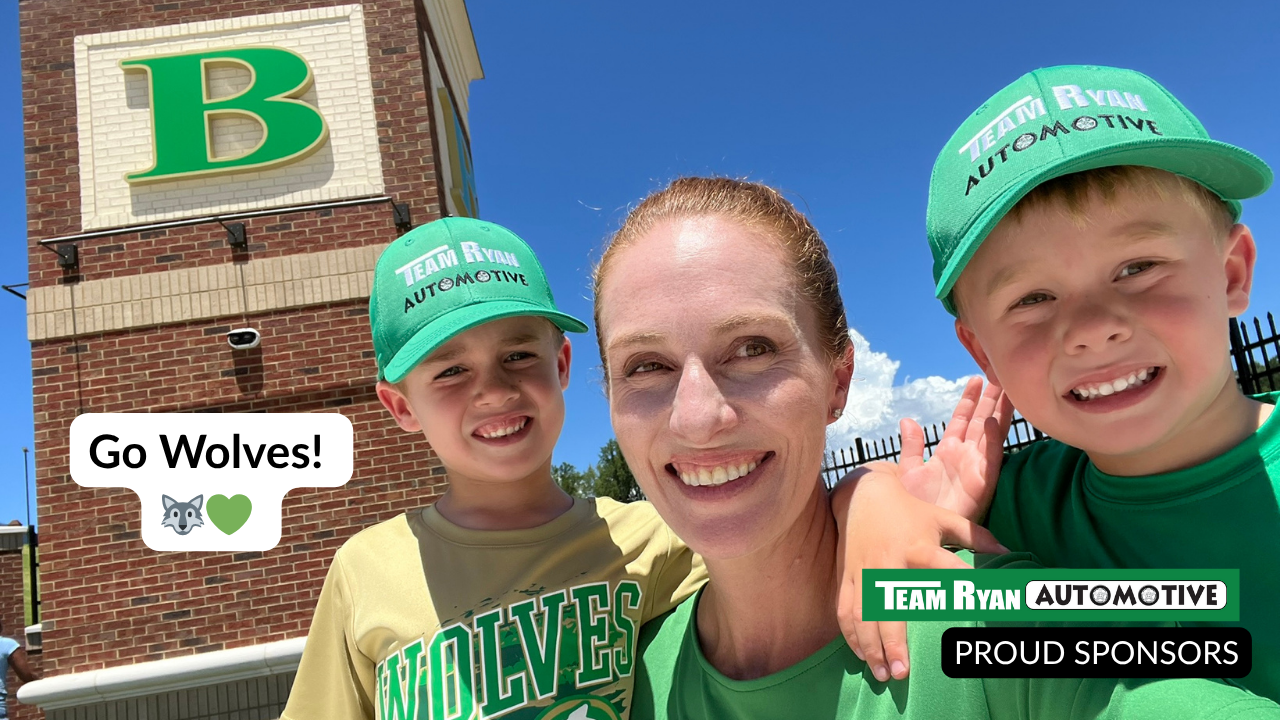
As Buford Highschool Football Sponsors, Team Ryan Automotive had the honor of attending the ribbon-cutting ceremony for the brand-new Phillip Beard Stadium. It was a milestone moment not only for Buford City Schools but for the entire Buford community. The heat was no joke, with temperatures nearing 100 degrees. As Phillip Beard himself remarked: “It’s hot out here!” But the sun didn’t stop the celebration or the community pride from showing up in full force. Joined by Georgia's Lieutenant Governor Burt Jones, school board members, and other dignitaries, this event was as much about celebrating legacy as it was about looking ahead. “This is a place where we can bring our community together and celebrate our students,” said Dr. Amy Chafin, Buford’s new superintendent, during her remarks. “It’s about our athletes, our band, our cheerleaders - it’s about everyone.” ( AJC ) At Team Ryan Automotive, we remain committed to supporting our community, investing in it now and for the future. We were honored to be part of an event that truly brought Buford together. Serving all communities for Buford and Cumming, GA.
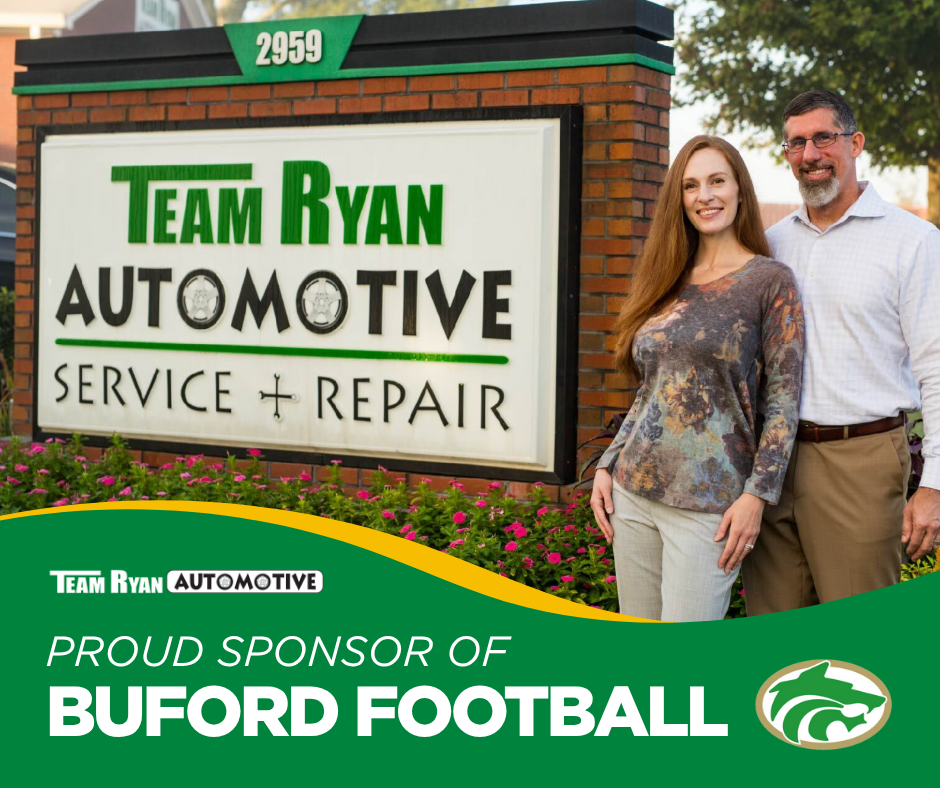
Team Ryan Automotive is a proud sponsor of Buford Football, and we’re honored to support the new Phillip Beard Stadium. The ribbon-cutting ceremony is set for Sunday, July 27 at 2 PM, marking the kickoff of a new era for the Wolves 🐺 As a family-owned business rooted in the community, we love cheering on our local high school, and this new stadium is truly something special. We’re proud to stand alongside our neighbors, the coaching staff, and these student-athletes who make our town proud. Join us in supporting Buford!

Summer Battery Tips from Team Ryan Automotive in Buford and Cumming When most drivers think of car battery issues, they often picture cold winter mornings. But in Georgia, the summer heat can be just as hard on your vehicle's battery . In fact, hot weather is one of the leading causes of battery failure. At Team Ryan Automotive, with locations in Buford and Cumming , we want you to stay prepared and safe through every season. Let’s take a closer look at how heat affects your battery and what you can do to prevent a sudden breakdown this summer. Why Heat is Harder on Your Battery Than Cold Although cold weather can make starting your car more difficult, summer heat is what causes the most long-term battery damage. Here’s why: High temperatures cause battery fluid to evaporate Heat speeds up corrosion inside the battery Excessive heat leads to internal breakdown of battery components Overworked air conditioning systems increase strain on the electrical system The result is a battery that wears out faster and can fail without warning. Common Signs of a Weak or Failing Battery Before your battery quits completely, it may show subtle signs of trouble. Watch for: Slow or sluggish engine start Dim headlights or dashboard lights Clicking sounds when turning the key Electrical accessories behaving erratically Dashboard battery warning light If you notice any of these symptoms, schedule a quick battery test with Team Ryan Automotive in Buford or Cumming. It only takes a few minutes to know whether your battery is strong enough for the summer heat. What You Can Do to Extend Battery Life Protecting your battery during the summer is easier than you think. Here are a few simple steps that make a big difference: Park in shaded areas or use a windshield sunshade to reduce cabin heat Keep your battery clean and corrosion free Turn off electronics before shutting off your engine Limit short trips that prevent full battery recharging Schedule regular maintenance with a trusted local shop At Team Ryan Automotive, our technicians inspect battery condition and charging system performance as part of our Summer Safety Inspection. Free Battery Testing at Team Ryan Automotive Not sure about the health of your battery? Our ASE certified team offers free battery checks at both our Buford and Cumming locations. We will assess voltage, cold cranking amps, and overall battery health so you can drive with confidence. If your battery needs to be replaced, we carry trusted brands that perform well in Georgia’s extreme summer heat. Stay Powered All Summer Long Don’t let a worn-out battery leave you stranded in the heat. Stop by Team Ryan Automotive in Buford or Cumming and let our expert team make sure your battery is ready for the road ahead. Schedule your Summer Safety Inspection or free battery check today and drive into the season with peace of mind. Team Ryan Automotive is your local source for trusted car care and dependable service. Your safety starts with being prepared, and we are here to help every step of the way.
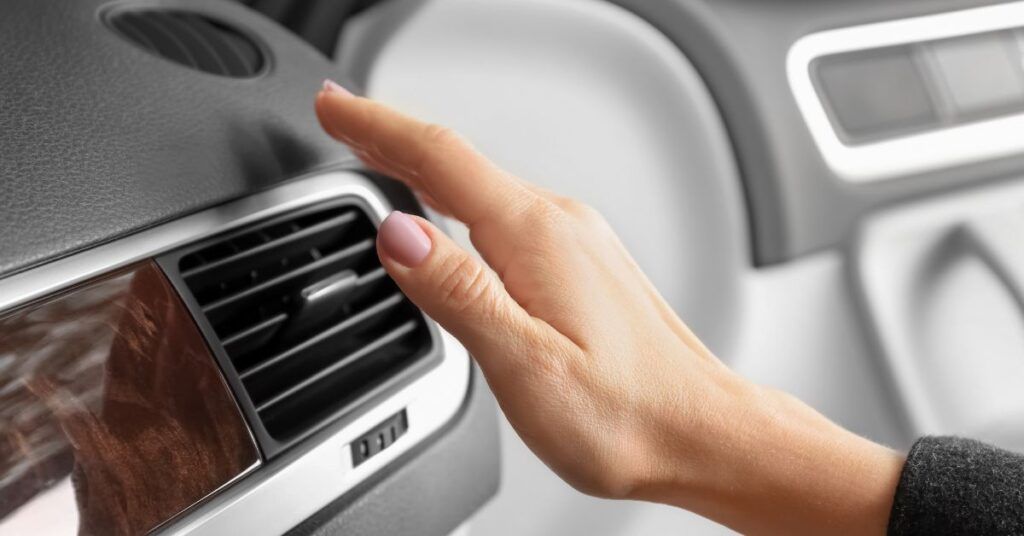
Stay Cool and Comfortable with Team Ryan Automotive in Buford and Cumming Summer in Georgia can be brutal, with scorching temperatures and high humidity creating serious discomfort for drivers across the state. When your vehicle's air conditioning is not performing at its best, every drive can quickly become miserable. But beyond comfort, a properly functioning AC system also plays a role in your safety, especially during long commutes or when you have young children, pets, or elderly passengers in the car. At Team Ryan Automotive, with convenient locations in both Buford and Cumming, we help drivers stay ahead of the heat. Our certified technicians specialize in diagnosing and repairing air conditioning systems for all vehicle makes and models. The earlier you catch signs of trouble, the easier it is to avoid costly repairs and uncomfortable drives. Here are five key signs that your AC system needs professional attention. 1. Weak or No Airflow from Vents When you turn on your air conditioning and barely feel any air coming from the vents, it is a red flag that something is wrong. Reduced airflow may be caused by a clogged cabin air filter, a malfunctioning blower motor, or issues within the ventilation system. This issue can make your AC work harder than necessary and lead to bigger problems if not addressed. At Team Ryan Automotive, our team inspects and replaces worn-out or dirty filters, tests your blower motor (when recommended), and checks for airflow obstructions. If you are in Buford or Cumming and notice that your vents are not pushing out enough air, let us take a closer look before Georgia’s heat gets worse. 2. Warm Air Coming Out Instead of Cold Perhaps the most obvious sign that your AC needs service is when you turn the dial to cold and only get warm air. This can be especially frustrating when temperatures are in the upper 80s or 90s. The problem often lies in low refrigerant levels, which may indicate a leak somewhere in the system. Other possible culprits include a faulty compressor or a problem with the AC condenser. Driving with a failing AC system not only makes for an uncomfortable experience but also puts stress on other parts of your vehicle. If you are experiencing warm air from your vents, schedule an AC performance test with Team Ryan Automotive. We will check refrigerant levels, inspect your system for leaks, and recharge the system as needed. Our Buford and Cumming technicians are ready to help you keep your cool all summer long. 3. Strange Noises When AC is Running Smooth and quiet operation is what you should expect from a healthy air conditioning system. So, if you start to hear grinding, squealing, or rattling when your AC is on, something is definitely off. These sounds may come from a worn-out compressor clutch, a damaged belt, a loose component, or a fan motor starting to fail. Unusual noises are often early warning signs that a breakdown is coming. Ignoring them can result in more expensive repairs down the road. At Team Ryan Automotive, our ASE certified technicians will conduct a full inspection and pinpoint the source of the noise. Whether you are in Buford or Cumming, do not wait for the problem to get worse. Let us fix it early and keep your AC running quietly and efficiently. 4. Unpleasant Smells from the Vents If turning on your air conditioner fills your car with a musty, moldy, or sour smell, it is time to take action. These odors often come from bacteria and mold buildup inside the evaporator core or from a dirty cabin air filter. Over time, moisture from your AC system provides the perfect environment for microbial growth, especially in humid climates like Georgia. These odors are not just unpleasant. They can be harmful to passengers with allergies or respiratory issues. Team Ryan Automotive offers complete AC sanitizing services to eliminate bacteria and mold from your system. We also replace cabin air filters and clean out your ducts to ensure the air inside your car is fresh and healthy. Whether you are driving in Buford or Cumming, our team has the tools and training to improve the air you breathe. 5. AC Takes Too Long to Cool the Cabin If it feels like your vehicle takes forever to cool down, or if it never really gets cold, your system may be operating below peak efficiency. This can happen when the compressor is beginning to fail, when the condenser is clogged or blocked, or when refrigerant levels are low. Over time, a system that has to work harder will use more energy and wear out more quickly. At Team Ryan Automotive, we use advanced diagnostic and testing procedures to assess the performance of your air conditioning system. We evaluate airflow, temperature output, compressor cycles, and overall efficiency. A quick test can reveal the issue and help you avoid uncomfortable drives later in the season. Whether you are in Buford or Cumming, we will make sure your system is cooling as fast and effectively as possible. Why AC Maintenance Matters in Georgia Many drivers only think about their air conditioning when it starts to act up. But regular maintenance is the key to preventing failure during the hottest months of the year. The heat and humidity in Georgia can push your AC system to the limit. That is why we recommend having it inspected each spring or early summer to catch problems before they affect your comfort and safety. Our Summer AC Service at Team Ryan Automotive includes: AC system performance testing Refrigerant level check and recharge if needed Visual inspection of all components Cabin air filter replacement Leak detection and repair AC compressor and belt inspection This preventative service gives you peace of mind all season and helps extend the life of your vehicle’s air conditioning system. Schedule Your AC Service Today in Buford or Cumming If you have noticed any of the signs above, do not wait until the next heatwave to take action. Schedule your air conditioning service at Team Ryan Automotive. Our friendly and experienced staff is here to help you stay cool, safe, and comfortable no matter where the road takes you. We proudly serve the Buford and Cumming communities with expert service, honest advice, and a commitment to quality that you can trust. Let us keep your car running its best and your AC system working the way it should. Call or visit Team Ryan Automotive today to schedule your Summer AC Service . Your comfort and safety are our top priorities.

Protect Your Engine with Help from Team Ryan Automotive in Buford and Cumming When summer arrives in Georgia, your vehicle’s cooling system becomes one of the most important safeguards against breakdowns. The rising temperatures and long hours on the road place added stress on your engine, and if your cooling system is not up to the task, you could find yourself stuck on the shoulder with smoke pouring from under the hood. At Team Ryan Automotive, with locations in both Buford and Cumming, we believe that preventing problems is the best form of vehicle care. Our technicians specialize in helping drivers prepare their vehicles for summer heat with expert cooling system inspections and maintenance. In this guide, we will walk you through how your cooling system works, what signs to look out for, and how to keep your engine protected throughout the hottest season of the year. Why Your Cooling System Matters More in Summer Your engine generates a significant amount of heat every time it runs. Without an effective cooling system, the engine temperature would rise quickly to dangerous and damaging levels. In the summer, that heat builds up even faster due to higher outdoor temperatures and more frequent use of the air conditioning system. This added strain makes the cooling system one of the most critical systems in your vehicle. Your cooling system includes several components working together to keep your engine at a safe operating temperature. These include: Radiator Water pump Thermostat Radiator fan Hoses and clamps Overflow reservoir Coolant or antifreeze When everything is working as it should, coolant circulates through the engine, absorbs heat, and releases that heat through the radiator. But when one component fails or fluid levels drop, the entire system can struggle to keep up. Warning Signs Your Cooling System Needs Attention Catching a cooling system issue early can prevent engine damage and expensive repairs. If you are in Buford or Cumming and notice any of the following symptoms, it is time to schedule an inspection at Team Ryan Automotive. 1. Temperature Gauge Climbing Higher Than Normal Your dashboard temperature gauge provides a quick view of your engine’s condition. If the needle is climbing past the halfway mark or if you see it in the red zone, stop driving immediately and have your vehicle inspected. For vehicles not equipped with a gauge, a warning light will alert you there is a problem brewing. Continuing to drive with an overheating engine can lead to permanent and expensive damage. 2. Steam or Smoke Coming from Under the Hood If you notice steam rising from the front of your vehicle, it usually indicates that your engine is overheating, and coolant is escaping from the radiator, reservoir, or somewhere else. This should never be ignored. Pull over safely and allow your engine to cool before seeking professional help. 3. Low Coolant Levels Pop the hood and take a look at your coolant reservoir. If the fluid level is below the recommended line or appears dirty or rusty, your cooling system may not be circulating coolant effectively. A leak could be to blame, or it could be time for a cooling system fluid service. 4. Visible Leaks or Puddles Under the Vehicle Coolant is usually a bright green, orange, blue, or pink color and has a sweet smell. If you see puddles or drips under your vehicle, especially near the front, it could mean you have a coolant leak from a hose, radiator, or water pump. 5. Unusual Noises from the Engine Area A failing water pump or loose radiator fan belt can create a whining or grinding noise near the front of the engine. These noises should not be ignored and often indicate an impending failure. What Happens if You Ignore Cooling System Problems Driving with a weak or damaged cooling system during Georgia’s summer months is risky. Even short trips can cause the engine to overheat. If the engine overheats repeatedly or for an extended period, the damage can be severe and expensive. Potential outcomes include: Cracked engine block Warped cylinder heads Blown head gasket Engine failure requiring full replacement At Team Ryan Automotive, we help Buford and Cumming drivers avoid these issues with timely diagnostics and expert repair services. A quick inspection could save you thousands of dollars and weeks of inconvenience. How to Maintain Your Cooling System Routine maintenance is the key to a reliable vehicle during the summer. Here are some of the most important steps you can take to keep your cooling system working properly: 1. Check Coolant Levels Regularly Before long drives or at the start of each month, pop the hood and inspect the coolant level. Make sure the fluid is between the minimum and maximum lines on the reservoir. Never open the radiator cap while the engine is hot. 2. Service and Replace Coolant as Needed Coolant loses its effectiveness over time and becomes contaminated. Specifically, the rust inhibitors “wear out” potentially exposing the entire system and all its components to rust and corrosion. Most vehicles need a flush cooling system fluid service every 30,000 to 60,000 miles, depending on the manufacturer’s recommendations. Servicing the system removes corrosion, scale buildup, and old fluid that can damage internal components. A proper service replaces 100% of the old coolant / anti-freeze with clean new fluid. This will help to prevent leaks and breakdowns. 3. Inspect Hoses and Belts The rubber hoses that move coolant through your system can crack, dry rot, or become brittle with age and heat exposure. Belts connected to the water pump or fan system can stretch or fray. Have these components inspected at least once per year, ideally before peak summer temperatures arrive. 4. Keep an Eye on the Temperature Gauge / Warning Light If your engine temperature consistently runs hotter than normal, even without obvious signs of overheating, have the system checked. If a warning light comes on, it is recommended to stop driving and call a repair facility that you trust immediately. A thermostat that opens too late, or a partially blocked radiator can reduce system efficiency. Summer Cooling System Service at Team Ryan Automotive Our Summer Cooling System Inspection is designed to give you peace of mind when temperatures rise. Whether you are commuting around Buford or heading out of Cumming for a summer road trip, we will make sure your vehicle is prepared. Our inspection includes: Coolant level and condition check Radiator and hose inspection Water pump and thermostat evaluation Radiator fan operation check Belt and clamp inspection If your vehicle needs repairs or a cooling system service, our team will explain your options clearly and provide honest recommendations. Why Buford and Cumming Drivers Trust Us At Team Ryan Automotive, we are proud to serve our local communities with honest service, expert diagnostic testing procedures, and transparent communication. Our ASE certified technicians treat every vehicle like it is their own. We never cut corners, and we are committed to helping you stay safe in every season. Whether you drive a car, truck, or SUV, we are here to help you beat the summer heat and drive with confidence. Schedule Your Cooling System Inspection Today Do not wait until you are stuck on the side of the road. Visit Team Ryan Automotive in Buford or Cumming and let our trusted team ensure your vehicle is ready for summer. Call now or schedule your appointment online . Your engine will thank you, and so will your passengers. Team Ryan Automotive is your local source for summer-ready vehicle care. Stay cool, stay safe, and stay on the road with expert service you can count on.
Recent Posts

Make Safety a Priority with Tire Maintenance from Team Ryan Automotive in Buford and Cumming As the school year kicks off and traffic increases around Buford and Cumming , your vehicle’s tires become more important than ever. Whether you are driving through busy school zones, sitting in carpool lines, or commuting long distances every day, the condition of your tires directly affects your safety, fuel efficiency, and overall performance on the road. At Team Ryan Automotive, we help Georgia drivers stay ahead of seasonal driving demands by focusing on the components that matter most. Your tires are your only point of contact with the road, making them essential for control, traction, and braking in all driving conditions. Before the school year ramps up, make sure your tires are ready for everything the road throws your way. Why Tire Maintenance Is Essential During the School Season Back-to-school driving typically involves more stop-and-go traffic, tighter turns in crowded parking lots, and more time spent behind the wheel overall. Many drivers also carry additional passengers or gear during this time, which increases the load placed on their tires. Without regular maintenance, tires can wear unevenly, lose air pressure, or fail unexpectedly. Driving with worn or underinflated tires makes it harder to steer, lengthens stopping distance, and increases your risk of a blowout. That risk is even greater when you are rushing through morning traffic or navigating wet roads during fall storms. Tire maintenance helps prevent these issues and gives you peace of mind as you drive your family to school, practice, or appointments. How to Inspect Your Tires at Home Even before visiting an auto shop, there are a few quick checks you can do yourself to assess the condition of your tires . Start by walking around your vehicle and checking the following: Tread Depth: Use the penny test to measure tread depth. Insert a penny into the tire groove with Lincoln’s head facing down. If you can see the top of his head, your tread is too low, and it is time to replace the tire. Sidewall Condition: Look for cracks, bulges, or cuts in the sidewall. These can indicate structural damage that may lead to a blowout. Tire Pressure: Use a tire gauge to measure air pressure and compare it to the recommended levels listed in your owner’s manual or on the driver-side door sticker. Be sure to check the tires when they are cold, not after driving. Tire Wear Pattern: Uneven tread wear can point to alignment issues or improper inflation. If the wear is more severe on one edge or in the center, bring your vehicle in for a professional inspection. Professional Tire Services You Should Schedule While home checks are helpful, they are not a substitute for a thorough inspection by a certified technician. At Team Ryan Automotive, our tire services go beyond basic checks, ensuring every aspect of your tire system performs properly. We recommend the following services before the school year starts: Tire Rotation: Rotating your tires regularly helps ensure they wear evenly and last longer. Different positions on the vehicle experience different types of wear, so rotating them every 5,000 to 7,500 miles helps even this out. Wheel Alignment : If your vehicle pulls to one side or your steering wheel is off-center, it could be a sign of misalignment. Misaligned wheels cause uneven tire wear, reduce handling, and shorten tire lifespan. We use precise alignment tools to correct the issue and protect your tires. Tire Balancing : If you feel vibration while driving at higher speeds, your tires may be out of balance. Tire balancing ensures that weight is distributed evenly around the wheel, helping to prevent excessive wear and suspension damage. Flat Repair: If you have a slow leak or have recently run over a nail, our team can often repair the tire and restore it to full function. We always inspect the tire thoroughly to ensure the damage is repairable and safe. Tire Replacement : If your tread is worn out or the sidewall is damaged, we offer high-quality replacement tires from top brands. Our technicians will help you choose the right tire for your vehicle, driving habits, and budget. Why Tire Pressure Is a Big Deal in Georgia Weather Georgia’s weather can fluctuate, especially as summer transitions into fall. These temperature changes affect your tire pressure more than you might expect. For every 10-degree change in temperature, your tire pressure can fluctuate by one to two pounds per square inch. Underinflated tires reduce fuel efficiency and increase heat buildup, which can cause premature tire wear or even failure. Overinflated tires reduce traction and can make your ride less comfortable. Maintaining tire pressure at the manufacturer’s recommended level enhances your gas mileage, prolongs tire life, and ensures your vehicle remains stable during sudden stops or turns. At Team Ryan Automotive, we check and adjust tire pressure as part of every inspection and service. We want your tires to perform their best, regardless of the temperature outside. Tread Depth and School Zone Safety Stopping distance is critical when driving in school zones. Children can appear suddenly, other vehicles may stop without warning, and speed limits are significantly reduced. Worn-out tires cannot grip the road effectively, especially in wet conditions, and that compromises your ability to brake quickly. Tires with deep, healthy tread offer better traction on wet pavement and allow for more responsive braking. If your tread depth is low, especially as rainstorms become more frequent, it is time to replace your tires. Driving through Buford and Cumming school zones with proper tread and pressure ensures you can stop when it matters most. What Makes Team Ryan Automotive Different When you visit Team Ryan Automotive in Buford or Cumming, you are not just getting a tire service. You are getting a partner who prioritizes your safety, explains your options clearly, and never pressures you into repairs you do not need. Our technicians are ASE certified and trained to work with all makes and models. Whether you drive a compact sedan, an SUV, or a family van, we have the tools and knowledge to care for your tires the right way. We believe in proactive service, not reactive repairs. Our goal is to help you stay ahead of issues before they become emergencies. That is why we encourage all drivers to include tire maintenance in their back-to-school car care routine. Schedule Your Tire Inspection Before the School Year Gets Busy The back-to-school season brings increased mileage, tighter schedules, and more road risks. Do not let worn or underperforming tires put your family’s safety in jeopardy. Let Team Ryan Automotive in Buford or Cumming inspect your tires and make sure they are ready for everything this season demands. Our tire services are fast, affordable, and focused on keeping your vehicle road ready. Whether you need a simple rotation or a full set of new tires, we are here to help. Call or schedule online today . Drive smarter, safer, and more confidently this school year with help from the tire experts at Team Ryan Automotive.

How to Prevent Common Back-to-School Breakdowns with Team Ryan Automotive in Buford and Cumming Back-to-school season brings early mornings, packed schedules, and an increase in daily driving. Whether you are taking your kids to school, commuting to work, or handling multiple pick-ups and drop-offs, your vehicle needs to be reliable, efficient, and safe. The last thing any driver wants is to deal with a breakdown during the morning rush or be stuck on the side of the road when school traffic is at its peak. At Team Ryan Automotive, serving Buford and Cumming , we help drivers prepare for the demands of the new school year with inspections and preventive maintenance designed to catch problems before they interrupt your schedule. If you want to avoid unexpected car trouble during the busiest time of year, now is the perfect time to make sure your vehicle is ready. Why Breakdowns Are More Common During Back-to-School Season As summer ends, driving habits change. Vehicles that were used lightly during summer vacations or sat idle in the heat now return to daily commutes, stop-and-go traffic, and regular use. Increased mileage, rising temperatures, and heavy loads can quickly reveal issues that have been developing quietly for months. Some of the most common problems we see at the start of the school year include dead batteries, overheating engines, tire blowouts, brake failures, and electrical malfunctions. These are often the result of worn-out parts, low fluid levels, or lack of maintenance. The good news is that most of these breakdowns are completely preventable with a timely inspection and a few smart service choices. Dead Battery One of the most common causes of unexpected breakdowns is a dead or weak battery. After months of exposure to summer heat, many batteries are already strained before the start of the school year. Once temperatures cool down and early morning startups become the norm, a worn-out battery may not have enough power left to crank the engine. To avoid getting stranded, schedule a battery test at Team Ryan Automotive. Our technicians will check your battery’s voltage, charge capacity, and overall health. If your battery is more than three years old or showing signs of failure, we can help you choose the correct replacement before it lets you down. Overheating Engine Stop-and-go traffic, long idling times in school pickup lines, and forgotten maintenance can all cause your engine to overheat. Many drivers ignore the warning signs until it is too late, leading to costly repairs. Prevent overheating by having your cooling system inspected. This includes checking the radiator, thermostat, hoses, coolant levels, and water pump. We recommend flushing and replacing coolant based on the TRA Maintenance schedule . Our technicians in Buford and Cumming can test your system for leaks and ensure everything is circulating properly. Tire Trouble Tires that are underinflated, worn out, or damaged are more likely to cause problems during the back-to-school rush. You are more likely to drive over curbs, potholes, and parking lot debris when you are navigating crowded school areas, which increases your risk of tire issues. Before school starts, inspect your tires for tread depth, sidewall damage, and proper air pressure. Uneven wear may indicate alignment problems, which can reduce handling and accelerate tire deterioration. Team Ryan Automotive offers free tire inspections and pressure checks at both locations, so you can drive with peace of mind. Brake Failure Brakes that are noisy, soft, or slow to respond are a serious safety risk, especially in school zones where quick stops are often required. The increased stop-and-go driving during the school year puts even more strain on your braking system. We recommend having your brakes checked for pad thickness, rotor wear, and fluid condition. If you hear squealing, grinding, or feel vibration when braking, do not delay. Our technicians can identify the issue and recommend service that restores safety and performance. Warning Lights on the Dashboard Dashboard warning lights often appear at the worst times. Whether it is your check engine light, ABS light, or low tire pressure alert, these signals should never be ignored. A small sensor issue can become a major mechanical failure if left unchecked. If a warning light comes on, bring your car to Team Ryan Automotive. We use advanced diagnostic tools to read fault codes and pinpoint the exact issue, saving you time and guesswork. Our team will explain what needs attention and what can wait, so you can make informed decisions that fit your schedule and budget. Poor Visibility Clear visibility is essential for safe driving, especially during early morning or late afternoon commutes. Headlights, taillights, and windshield wipers must function properly in all weather conditions. Check all exterior lights to make sure they are working and replace any that are dim or burned out. Inspect your wiper blades for streaking or skipping. If they are worn out, we can install new blades quickly during your visit. Do not forget to top off windshield washer fluid to keep your view clear on rainy or foggy mornings. HVAC System Performance Your heating, ventilation, and air conditioning system should be ready for fluctuating weather as well as for keeping passengers comfortable during daily drives. A well-maintained HVAC system also plays a role in defrosting your windshield and maintaining safe visibility. If your AC is blowing warm air or your defrost is slow to respond, schedule an inspection. Our team will check the cabin air filter, blower motor, refrigerant level, and AC compressor to ensure consistent and reliable performance. Suspension and Steering Issues Rough rides and poor handling can make back-to-school driving stressful and unsafe. Worn suspension components may not absorb road impact correctly, causing instability during turns and braking. Have your shocks, struts, and steering components inspected if you notice clunking noises, pulling to one side, or excessive bouncing. Team Ryan Automotive performs complete suspension diagnostics to restore ride quality and handling precision. The Importance of Preventive Maintenance Preventive maintenance is the smartest investment you can make in your vehicle. A small service today could prevent a major repair tomorrow. At Team Ryan Automotive, we provide complete vehicle inspections designed to prepare your car for the season ahead. Our back-to-school readiness services include: Battery testing Cooling system inspection Brake inspection and fluid check Tire pressure and tread evaluation Oil and filter change Wiper and light check HVAC system test Diagnostic scan for warning lights Our goal is to help Buford and Cumming drivers start the school year with confidence, not car trouble. Schedule Your Inspection with Team Ryan Automotive There is no better time to schedule a complete inspection than right now. Before the school bell rings and your calendar fills up, bring your vehicle to Team Ryan Automotive for a back-to-school checkup. Our ASE-certified technicians are here to make sure your vehicle is ready for the morning commute, the after-school rush, and every mile in between. With convenient locations in Buford and Cumming , flexible appointment times, and honest service you can trust, we make it easy to stay on top of maintenance. Call or schedule online today . Keep your family safe, your schedule on track, and your car in peak condition this school year with help from Team Ryan Automotive.

How to Prevent Common Back-to-School Breakdowns with Team Ryan Automotive in Buford and Cumming Back-to-school season brings early mornings, packed schedules, and an increase in daily driving. Whether you are taking your kids to school, commuting to work, or handling multiple pick-ups and drop-offs, your vehicle needs to be reliable, efficient, and safe. The last thing any driver wants is to deal with a breakdown during the morning rush or be stuck on the side of the road when school traffic is at its peak. At Team Ryan Automotive, serving Buford and Cumming , we help drivers prepare for the demands of the new school year with inspections and preventive maintenance designed to catch problems before they interrupt your schedule. If you want to avoid unexpected car trouble during the busiest time of year, now is the perfect time to make sure your vehicle is ready. Why Breakdowns Are More Common During Back-to-School Season As summer ends, driving habits change. Vehicles that were used lightly during summer vacations or sat idle in the heat now return to daily commutes, stop-and-go traffic, and regular use. Increased mileage, rising temperatures, and heavy loads can quickly reveal issues that have been developing quietly for months. Some of the most common problems we see at the start of the school year include dead batteries, overheating engines, tire blowouts, brake failures, and electrical malfunctions. These are often the result of worn-out parts, low fluid levels, or lack of maintenance. The good news is that most of these breakdowns are completely preventable with a timely inspection and a few smart service choices. Dead Battery One of the most common causes of unexpected breakdowns is a dead or weak battery. After months of exposure to summer heat, many batteries are already strained before the start of the school year. Once temperatures cool down and early morning startups become the norm, a worn-out battery may not have enough power left to crank the engine. To avoid getting stranded, schedule a battery test at Team Ryan Automotive. Our technicians will check your battery’s voltage, charge capacity, and overall health. If your battery is more than three years old or showing signs of failure, we can help you choose the correct replacement before it lets you down. Overheating Engine Stop-and-go traffic, long idling times in school pickup lines, and forgotten maintenance can all cause your engine to overheat. Many drivers ignore the warning signs until it is too late, leading to costly repairs. Prevent overheating by having your cooling system inspected. This includes checking the radiator, thermostat, hoses, coolant levels, and water pump. We recommend flushing and replacing coolant based on the TRA Maintenance schedule . Our technicians in Buford and Cumming can test your system for leaks and ensure everything is circulating properly. Tire Trouble Tires that are underinflated, worn out, or damaged are more likely to cause problems during the back-to-school rush. You are more likely to drive over curbs, potholes, and parking lot debris when you are navigating crowded school areas, which increases your risk of tire issues. Before school starts, inspect your tires for tread depth, sidewall damage, and proper air pressure. Uneven wear may indicate alignment problems, which can reduce handling and accelerate tire deterioration. Team Ryan Automotive offers free tire inspections and pressure checks at both locations, so you can drive with peace of mind. Brake Failure Brakes that are noisy, soft, or slow to respond are a serious safety risk, especially in school zones where quick stops are often required. The increased stop-and-go driving during the school year puts even more strain on your braking system. We recommend having your brakes checked for pad thickness, rotor wear, and fluid condition. If you hear squealing, grinding, or feel vibration when braking, do not delay. Our technicians can identify the issue and recommend service that restores safety and performance. Warning Lights on the Dashboard Dashboard warning lights often appear at the worst times. Whether it is your check engine light, ABS light, or low tire pressure alert, these signals should never be ignored. A small sensor issue can become a major mechanical failure if left unchecked. If a warning light comes on, bring your car to Team Ryan Automotive. We use advanced diagnostic tools to read fault codes and pinpoint the exact issue, saving you time and guesswork. Our team will explain what needs attention and what can wait, so you can make informed decisions that fit your schedule and budget. Poor Visibility Clear visibility is essential for safe driving, especially during early morning or late afternoon commutes. Headlights, taillights, and windshield wipers must function properly in all weather conditions. Check all exterior lights to make sure they are working and replace any that are dim or burned out. Inspect your wiper blades for streaking or skipping. If they are worn out, we can install new blades quickly during your visit. Do not forget to top off windshield washer fluid to keep your view clear on rainy or foggy mornings. HVAC System Performance Your heating, ventilation, and air conditioning system should be ready for fluctuating weather as well as for keeping passengers comfortable during daily drives. A well-maintained HVAC system also plays a role in defrosting your windshield and maintaining safe visibility. If your AC is blowing warm air or your defrost is slow to respond, schedule an inspection. Our team will check the cabin air filter, blower motor, refrigerant level, and AC compressor to ensure consistent and reliable performance. Suspension and Steering Issues Rough rides and poor handling can make back-to-school driving stressful and unsafe. Worn suspension components may not absorb road impact correctly, causing instability during turns and braking. Have your shocks, struts, and steering components inspected if you notice clunking noises, pulling to one side, or excessive bouncing. Team Ryan Automotive performs complete suspension diagnostics to restore ride quality and handling precision. The Importance of Preventive Maintenance Preventive maintenance is the smartest investment you can make in your vehicle. A small service today could prevent a major repair tomorrow. At Team Ryan Automotive, we provide complete vehicle inspections designed to prepare your car for the season ahead. Our back-to-school readiness services include: Battery testing Cooling system inspection Brake inspection and fluid check Tire pressure and tread evaluation Oil and filter change Wiper and light check HVAC system test Diagnostic scan for warning lights Our goal is to help Buford and Cumming drivers start the school year with confidence, not car trouble. Schedule Your Inspection with Team Ryan Automotive There is no better time to schedule a complete inspection than right now. Before the school bell rings and your calendar fills up, bring your vehicle to Team Ryan Automotive for a back-to-school checkup. Our ASE-certified technicians are here to make sure your vehicle is ready for the morning commute, the after-school rush, and every mile in between. With convenient locations in Buford and Cumming , flexible appointment times, and honest service you can trust, we make it easy to stay on top of maintenance. Call or schedule online today . Keep your family safe, your schedule on track, and your car in peak condition this school year with help from Team Ryan Automotive.





